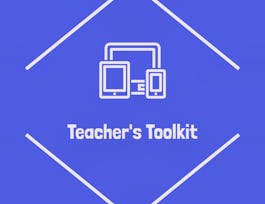The Foundations of Teaching for Learning programme is for anyone who is teaching, or who would like to teach, in any subject and any context - be it at school, at home or in the workplace. With dynamic lessons taught by established and respected professionals from across the Commonwealth, this eight course programme will see you develop and strengthen your skills in teaching, professionalism, assessment, and more. As you carry on through the programme, you will find yourself strengthening not only your skills, but your connection with colleagues across the globe. A professional development opportunity not to be missed.



Foundations of Teaching for Learning: Introduction to Student Assessment



Instructors: Dr Peter Keegan
22,421 already enrolled
Included with 
(984 reviews)
Details to know

Add to your LinkedIn profile
6 assignments
See how employees at top companies are mastering in-demand skills


Earn a career certificate
Add this credential to your LinkedIn profile, resume, or CV
Share it on social media and in your performance review

There are 6 modules in this course
What is the purpose of assessment? Research has shown that opinions on this differ around the world. In this week’s general introduction to assessment theory and practice, you can compare your own experience of assessment with some contrasting experiences from different parts of the world. We will take a clear look at how educational assessment integrates and links curriculum, teaching, and learning. We will then look at cultural factors that may influence the teaching practices of your workplace.
What's included
5 videos4 readings1 assignment
Feedback can vary greatly in its effectiveness. In the lectures this week we will identify the key characteristics of good (and bad) feedback. We will explore the practice of incorporating feedback into teaching. Teachers and students have their own views on what constitutes effective feedback. Understanding these views can help you to decide how you should give feedback to your own students. We will ask you to consider how you can best provide feedback to minority students. By the end of the week you should be able to generate your own examples of effective feedback for students.
What's included
5 videos1 reading1 assignment1 peer review
Welcome back to our third week of exploring ideas connected to assessment. In the lectures this week, we explore current approaches to reporting and raise important questions about their validity. We will consider the strengths and weaknesses of standardized test scores and point you to effective techniques for writing reports and giving feedback that will actually help students and pupils improve their learning. We will give you tools for use in your own practice and encourage you how reporting practices used with majority groups might need to be modified for use with parents from minority groups.
What's included
5 videos1 reading1 assignment
This week we describe specific techniques for designing assessment tools. The assessment tool that we will focus on is multiple-choice questions (MCQs), however we will present a number of different formats. You will be given practical advice and tools for creating a variety of good test questions. The key point to note is that unless such objectively-scored questions are written well, getting them right will not be an indicator of knowledge or skill in the domain being assessed. Test-wiseness (i.e., knowing how to answer such questions) increases test scores but this is no guarantee students actually understand more. Hence, care and attention needs to be paid to how test questions are written. Stay active – and enjoy the learning this week.
What's included
5 videos1 reading1 assignment1 peer review
Last week we focused on assessments that could be scored against agreed correct answers. We will now look at judgement-based assessments. The main assessment method used in teaching has changed from objective-style to using judgement-based assessment. This change has brought forward some new issues for us to consider. We will introduce you to challenges that are inherent in designing and evaluating student performance in open-ended formats in the first lecture. In the next two lectures we will focus on two assessment tools that are often used under judgement-based conditions: the rubric and the essay. In the last lecture, we will explore the concepts of moderation and inter-rater reliability. The topics for this week require you to grapple with notions of accuracy, quality, reliability, validity, and error. By the end of the week you should be able to design a valid and reliable assessment task and corresponding marking scheme (rubric).
What's included
5 videos1 reading1 assignment
In this final week we will define two assessment practices that involve student participation: self-assessment and peer assessment. We will provide you with exemplars of both kinds of assessment for your own personal use, and point you to important issues that you will need to consider when preparing your own assessments. By the end of this week you should be able to create peer and self-assessment tasks that facilitate learning for children you teach.
What's included
5 videos1 reading1 assignment
Instructors



Offered by
Recommended if you're interested in Education

Commonwealth Education Trust

Commonwealth Education Trust

Commonwealth Education Trust

Coursera Project Network
Why people choose Coursera for their career




Learner reviews
Showing 3 of 984
984 reviews
- 5 stars
89.37%
- 4 stars
7.54%
- 3 stars
1.98%
- 2 stars
0.69%
- 1 star
0.39%

Open new doors with Coursera Plus
Unlimited access to 7,000+ world-class courses, hands-on projects, and job-ready certificate programs - all included in your subscription
Advance your career with an online degree
Earn a degree from world-class universities - 100% online
Join over 3,400 global companies that choose Coursera for Business
Upskill your employees to excel in the digital economy
Frequently asked questions
Access to lectures and assignments depends on your type of enrollment. If you take a course in audit mode, you will be able to see most course materials for free. To access graded assignments and to earn a Certificate, you will need to purchase the Certificate experience, during or after your audit. If you don't see the audit option:
The course may not offer an audit option. You can try a Free Trial instead, or apply for Financial Aid.
The course may offer 'Full Course, No Certificate' instead. This option lets you see all course materials, submit required assessments, and get a final grade. This also means that you will not be able to purchase a Certificate experience.
When you enroll in the course, you get access to all of the courses in the Specialization, and you earn a certificate when you complete the work. Your electronic Certificate will be added to your Accomplishments page - from there, you can print your Certificate or add it to your LinkedIn profile. If you only want to read and view the course content, you can audit the course for free.
If you subscribed, you get a 7-day free trial during which you can cancel at no penalty. After that, we don’t give refunds, but you can cancel your subscription at any time. See our full refund policy.

